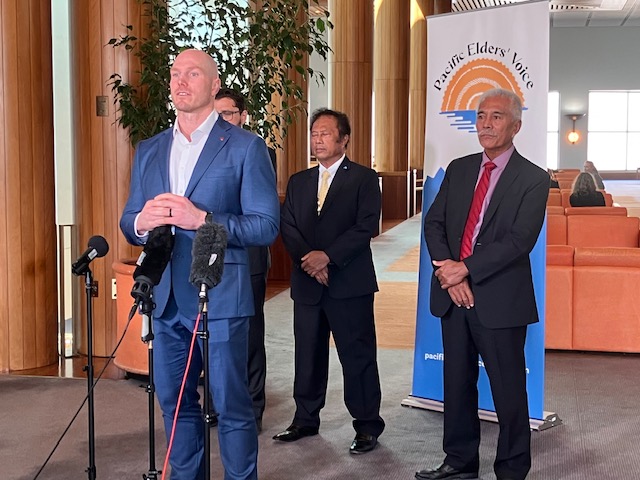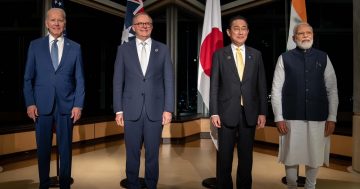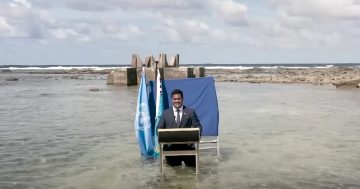
Senator David Pocock with Pacific Elders Tommy Remengesau Jr and Anote Tong. Photo: Chris Johnson.
Independent Senator for the ACT David Pocock has joined with Pacific island elders in calling for the Australian Government to take stronger action on climate change and embrace policies that could help the very survival of small nations in the region.
Former Kiribati president Anote Tong and former Palau president Tommy Remengesau Jr have been in Canberra representing the independent advisory group Pacific Elders’ Voice to ask for Australia’s help in ensuring a future for tiny island states.
Mr Tong is a longtime visitor to Australia and has been fighting for action on climate for nearly two decades.
In 2015 he led a call for a moratorium on new fossil fuel projects, saying then that more such ventures would see the demise of his country.
In Canberra this week, the former president said he was still asking and waiting for the moratorium.
He pointed to science that predicted Kiribati and other small island nations would not be habitable by 2060 unless drastic action is implemented immediately.
“Our purpose in coming here at this time was very deliberate because we hope that your government is still formulating its policies on climate change and we thought this would be a great opportunity to maybe advise them of some ideas that are pertaining to the Pacific islands.” Mr Tong said.
“Of course, we are very conscious of the fact that the current government is willing to take a much more proactive scientific approach to climate change and wants to be more proactive with respect to the Pacific.
“For countries like ours, our future depends on it.”
He acknowledged last week’s passing of legislation for a 43 per cent minimum emissions reduction target by 2030 and net zero by 2050.
Mr Remengesau described the region as a family and called on Australia to be a big brother and care for its smaller neighbours.
“Really, the message that we bring together is a united message, because while we are ex-presidents we share the same message from our current island presidents and prime ministers,” he said.
“This is all because we are all in the same … very delicate, perilous moment in our existence.
“So our message is really that we come here and we emphasise the need for family and family action, Australia being the big brother that needs to take the lead when it comes to reducing climate change.”
Both former presidents said although they understood and even welcomed Australia’s desire to host a United Nations Climate Change Conference of Parties (COP 29) in 2024, it would be a contradiction and even seem wrong if the government was still approving new fossil fuel projects.
Senator Pocock said the issue of where Australian coal and gas was burned was not the concern for Pacific islands, but rather that it shouldn’t be burned at all.
“Here in Australia, we care a lot about the Pacific family, and this is clearly something where we have to step up and ensure that our actions match our talk when it comes to this family,” he said.
“Some of these Pacific island nations have moved beyond having adaptation plans to having survival plans.
“We have a moral responsibility to stand with them … Really, we are at a point in our history where we have to look at our actions going forward and how much responsibility we are willing to take for what we are doing.”
Senator Pocock also commented on the appointment of three women with environmental backgrounds to the board of the Climate Change Authority.
In response to the Coalition appointing business leaders to the advisory body, the Labor government has appointed Professor Lesley Hughes, Dr Virginia Marshall, and Sam Mostyn – all with strong climate change credentials – to the board.
“It’s a great first step,” Senator Pocock said.
“I’d like to see another person or two on there with climate science backgrounds.”
Asked if the authority’s chair (Grant King, a former head of Origin Energy and president of the Business Council of Australia) should be replaced by someone with a climate science background, Senator Pocock said, “I’d love to see that”.














